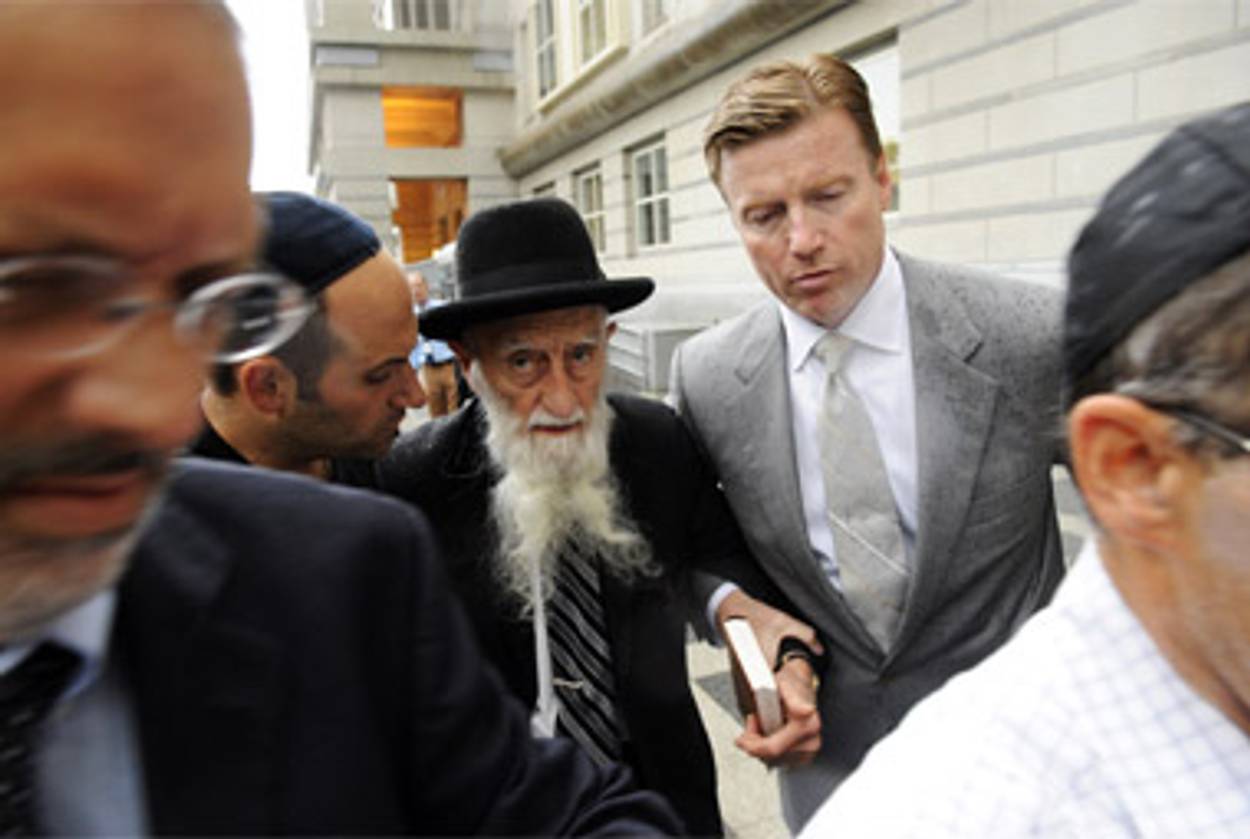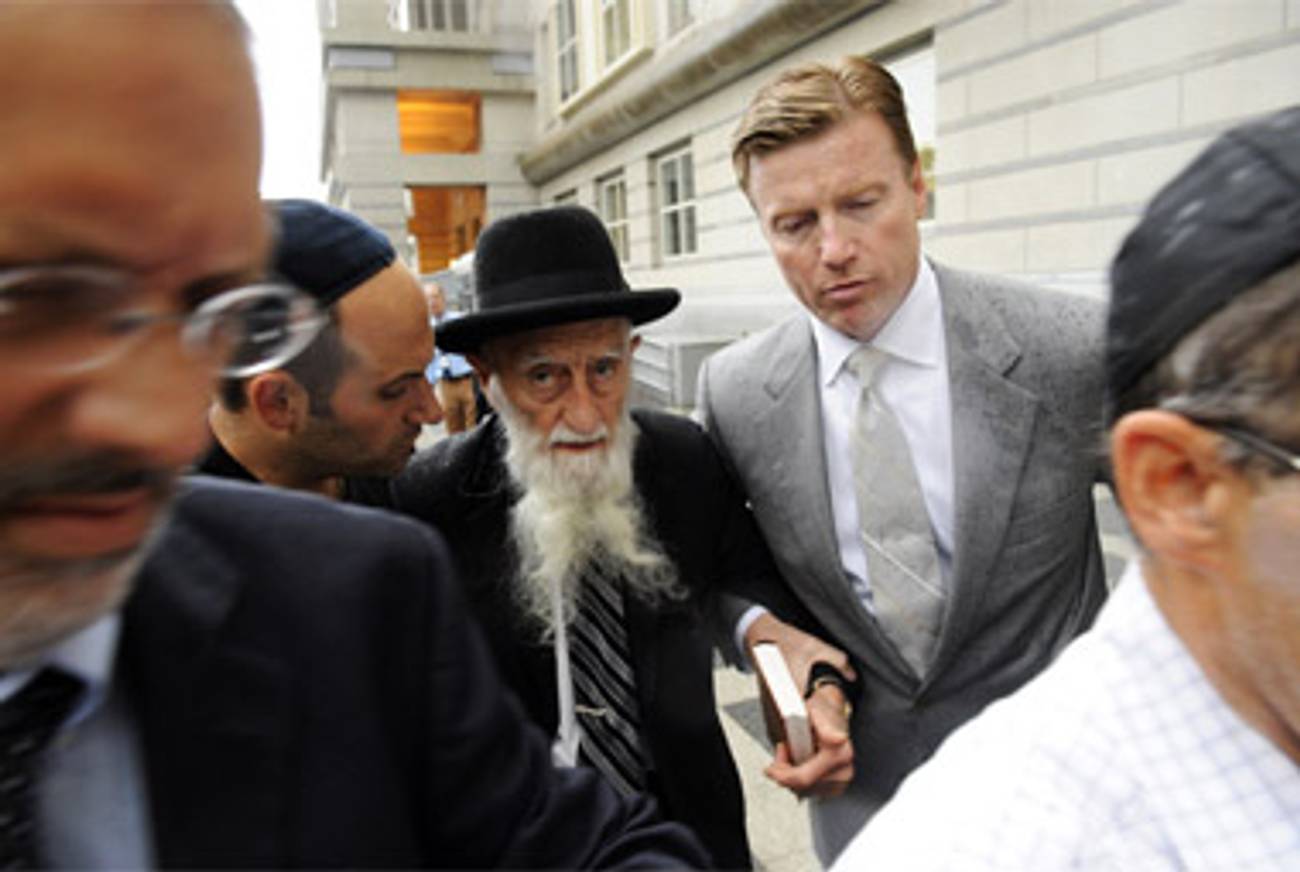Crisis of Faith
How a venerated rabbi got swept up in a sensational crime




Wherever Rabbi Saul Kassin expected to be yesterday, it probably wasn’t in a federal booking room in Newark, New Jersey. Whether at his home in Gravesend, Brooklyn, or at his son’s palatial summer estate in Deal, New Jersey, Kassin was likely scheduled to spend the day receiving visitors, eating, and praying; instead, he wound up facing an array of money-laundering charges with some of his fellow rabbis and a clutch of local politicians nabbed in one of the biggest, and broadest, corruption cases ever.
As the chief rabbi of the largest Syrian Jewish synagogue in the United States—referred to during a press conference by Newark’s FBI chief as the “Syrian Jewish Church,” a slip of the tongue that conjured up images of Eastern Orthodoxy and patriarchy—Kassin is the de facto leader of the 75,000 Syrian Jews in New York. As such, his duties include not only governing the spiritual needs of his flock, but overseeing a generous network of communal services, from K-12 parochial schools to recreational facilities and care for the elderly, provided for free through synagogue-affiliated charities to keep members of the tight-knit community close.
But in court documents filed yesterday, federal investigators claimed the charities were financed at least in part with hundreds of thousands of dollars in cuts Kassin took from supplicants, both locally and in Israel, who used the charities as fronts to launder money they made from illicit business dealings. Investigators portrayed the 87-year-old rabbi, scion of a Jerusalem rabbinic dynasty, as a shrewd operator who acted as a kind of central banker to other rabbis in New York and New Jersey doing the same thing on a smaller scale. It’s an image strikingly at odds with the pictures of Kassin, bearded and somber in his black hat and coat, clutching what looks like a prayer book, captured as he entered the federal courthouse in Newark.
“Rabbi Kassin, within the community establishment, is viewed, I think it’s fair to say, as a venerated figure,” said Zev Chafets, who has written about the Syrian Jewish community. “He’s a symbol of the connection with Syria, and a symbol of continuity and authority.”
Kassin—who goes by his Hebrew name, Shaul—came to the U.S. in 1933 from Jerusalem, where his father, Rabbi Jacob Kassin, was known as a scholar of Talmud and Kabbalah, according to a family history written by Sarina Roffe, an expert in Syrian Jewry. The elder Kassin looked around at the teeming world of New York, full of Ashkenazic Jews and enticements to assimilation, and responded by issuing an Edict, in 1935, threatening the excommunication of any Syrian Jew who dared to intermarry, even—or especially—if the would-be spouse had converted.
Saul Kassin, who Roffe says edited the yearbook during his time at Yeshiva University, took up the defense of his father’s edict when he inherited the position of chief rabbi in 1994; according to Chafets, Kassin even excommunicated his own daughter, Anna, who married a gentile.
“We cut her off,” Kassin’s son, Jakie, told Chafets. But that was the price of holding the community together, especially as it grew fabulously wealthy, largely from cash businesses—real estate, manufacturing, import-export—that flourished over the past decade. Instead of moving away, the Syrians stayed close, turning Gravesend, in deepest Brooklyn, into a kind of millionaire’s paradise, where houses sell at Fifth Avenue prices. (At the height of the real estate boom, in 2006, one tear-down on a double lot went for $11 million.)
According to Roffe, Kassin was also known as an adept mathematician; perhaps his ease with numbers gave him an ease with the world of business his relatives and congregants inhabited that other rabbis wouldn’t necessarily have had. His prominence gave him access to far more money than neighboring synagogues, or rival ones; another accused rabbi, Edmond Nahum, of the Deal Synagogue, estimated Kassin was taking in hundreds of thousands of dollars a week “at least,” through an unnamed charity affiliated with his synagogue, Shaare Zion. “Kassin is the best,” Nahum allegedly told the government’s mole in the community, identified as Solomon Dwek, the son of another community rabbi, who was arrested in 2006 on suspicion of trying to perpetrate a $50 million check-kiting scam.
Dwek has been portrayed as the Judas of the story, who apparently agreed to help the government break apart money-laundering operations in the Syrian community. According to the court documents, Dwek approached Nahum and another rabbi, Eliahu Ben Haim, head of Ohel Yaacob, a congregation in Deal, with checks he claimed came from selling counterfeit Prada and Gucci handbags. He told the rabbis he was trying to avoid getting noticed by the authorities; he wanted, he said, “an effective way to get rid of the money.” Nahum and Ben Haim provided the introduction to Kassin, undoubtedly considered the government’s “big fish”; at repeated meetings in Gravesend and Deal, the court documents describe Kassin asking why Dwek needed him at all. At one point, Kassin, who said he was trying to be careful with his accounts, asked Dwek what he was supposed to say should anyone “ever come ask me, ‘what’s this, this money that you’re taking.’” Dwek said the money couldn’t ever be traced to him, and Kassin allegedly went ahead with the deal, taking $2,500 to issue Dwek a check drawn on his charitable accounts that one of the other rabbis agreed to cash.
All told, Kassin allegedly washed $200,000 for Dwek between June 2007 and December 2008—at which point, investigators appear to have decided they had enough evidence against the rabbis, and shifted their focus to New Jersey’s political structure. So far, the community has rallied around him, insisting to television cameras that the rabbi is innocent; Kassin’s attorney, Robert Stahl, who secured the rabbi’s release on $200,000 bail, told reporters yesterday that the rabbi “remains confident that the truth will come out,” and that his name will be cleared.
Allison Hoffman is a senior editor at Tablet Magazine. Her Twitter feed is @allisont_dc.
Allison Hoffman is a senior editor at Tablet Magazine. Her Twitter feed is @allisont_dc.